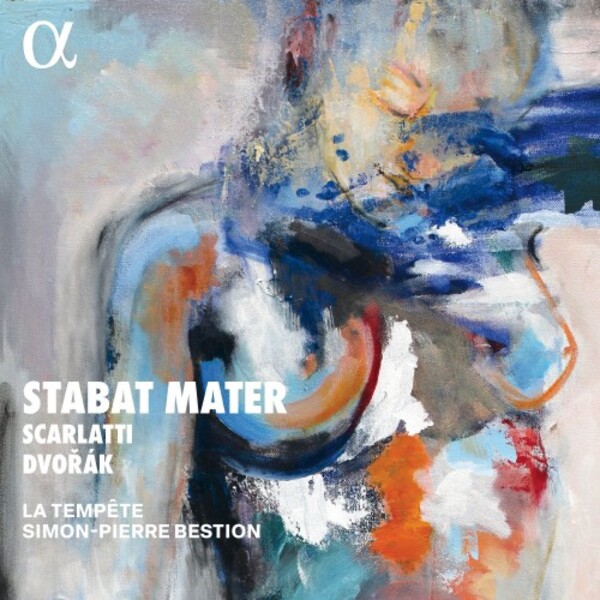DVOŘÁK; SCARLATTI Stabat Mater
View record and artist detailsRecord and Artist Details
Genre:
Vocal
Label: Alpha
Magazine Review Date: 04/2024
Media Format: CD or Download
Media Runtime: 94
Mastering:
DDD
Catalogue Number: ALPHA1054

Tracks:
| Composition | Artist Credit |
|---|---|
| Stabat mater |
Domenico Scarlatti, Composer
Aline Quentin, Alto Amelie Raison, Soprano Edouard Monjanel, Tenor Florent Martin, Bass La Tempête Simon-Pierre Bestion, Conductor |
Author: David Patrick Stearns
By now, audiences know not to expect anything conventional from Simon-Pierre Bestion, who imposes all kinds of outside influences on to composers from Monteverdi to Rachmaninov, often in a hyper-animated manner that may capture the ear of newcomers. But such projects can’t help being a qualified success, if only because Bestion is in the confrontation business, pitting one composer against the other – this time Domenico Scarlatti and Antonín Dvořák – which means losing some elements in an attempt to gain others. The inspiration for doing so on this disc is reincarnation – his word is ‘rebirth’ in the booklet interview describing Scarlatti’s relationship with Dvořák – which many musicians would not want to publicly admit, no matter how deeply they might believe it. But Bestion is out to prove his point by interspersing movements of the respective composers’ Stabat mater settings (Scarlatti’s from 1715, Dvořák’s from 1877), the loss being overall continuity in the respective pieces, while gains are elusive. Bestion also goes on to say that this project has given Scarlatti a third life. Really? Did he need one? And is this third life worth having?
To his credit, Bestion works hard to make the fusion seem sensible, having transcribed both pieces so that the playing field is more even, claiming to beef up Scarlatti with presumably more than usual strings plus continuo while Dvořák is scaled down to the piano version written by the composer himself, but augmented by Bestion with strings. The sequencing of the movements is thoughtful, starting with a tasteful instrumental prelude based on Scarlatti, and then representing each composer usually two or three movements at a time. Two Dvořák movements – ‘Virgo virginum praeclara’ and ‘Fac ut portem’ – are left out, but some chant is added in the middle of the sequence. I’ve heard much more incongruent juxtapositions – Haydn and Webern string quartets, for one – but the two composers have fundamental differences that don’t allow them to be comfortable bedfellows.
Scarlatti is essentially concise; Dvořák is fundamentally expansive. Scarlatti’s opening chorus is followed by Dvořák’s, which is more than five times as long. Using similar forces for each piece ought to aid a sense of continuity – the chorus numbers 24 and instruments number 20, all used in various configurations – though the presence of a modern piano in the Dvořák is a constant reminder of the eras that separate the two pieces. One stroke of continuity that does indeed work is holding the final note of Scarlatti’s ‘Amen’ – played like fine filigree – to dovetail with Dvořák’s finale (‘Quando corpus morietur’).
As for the singing, vocal blend is secondary to an intensity of expression that also demands slowish tempos. The Dvořák tempos might be appropriate in the full-orchestral version but when applied to a smaller-sound ensemble, moments that strive for monumentality come off as phlegmatic. In Scarlatti, the healthy pulse heard in Vox Luminis’s opening chorus (Ricercar, 4/08) comes in at 3'00" while the more contemplative Bestion is worse off for being 3'31". The chorus deliver their best singing for Scarlatti, though solo roles in the Dvořák are taken by chorus members who get the job done but can wear on the ears when exposed unflatteringly amid the slimmed-down instrumental contingent. Using the Dvořák piano version as is, Laurence Equilbey (Naïve) has Brigitte Engerer playing with far more style and meaning plus the refined Accentus Chamber Choir. Where does that leave Bestion? With a brainy playlist full of mystical pretensions.
Explore the world’s largest classical music catalogue on Apple Music Classical.
Included with an Apple Music subscription. Download now.

Gramophone Digital Club
- Digital Edition
- Digital Archive
- Reviews Database
- Full website access
From £8.75 / month
Subscribe
Gramophone Full Club
- Print Edition
- Digital Edition
- Digital Archive
- Reviews Database
- Full website access
From £11.00 / month
Subscribe
If you are a library, university or other organisation that would be interested in an institutional subscription to Gramophone please click here for further information.




